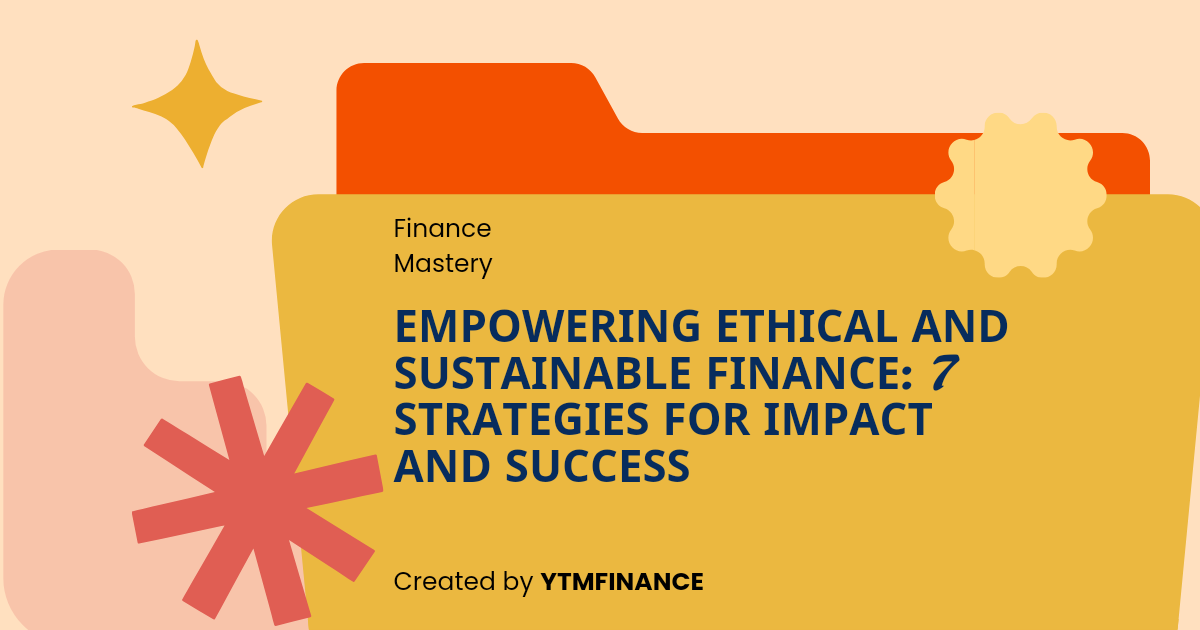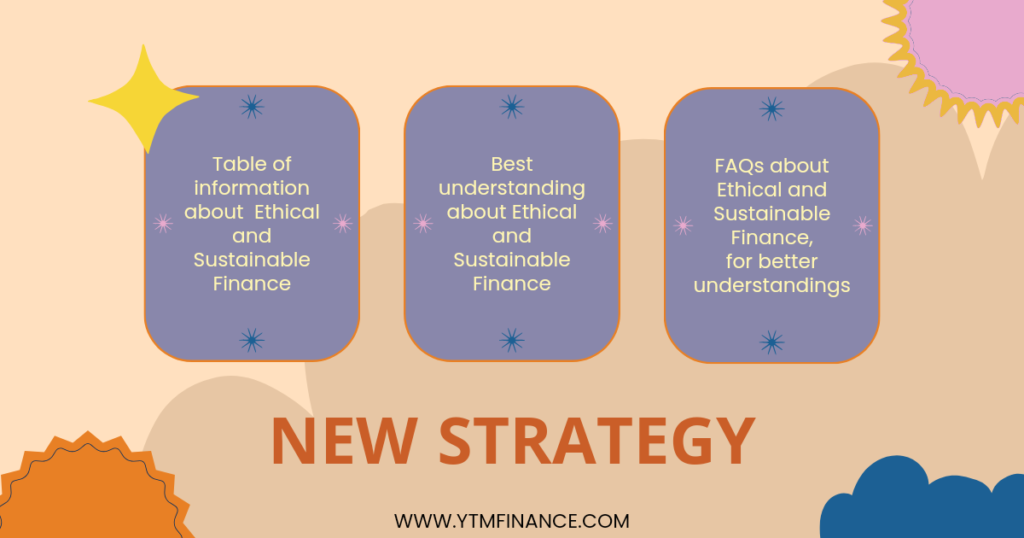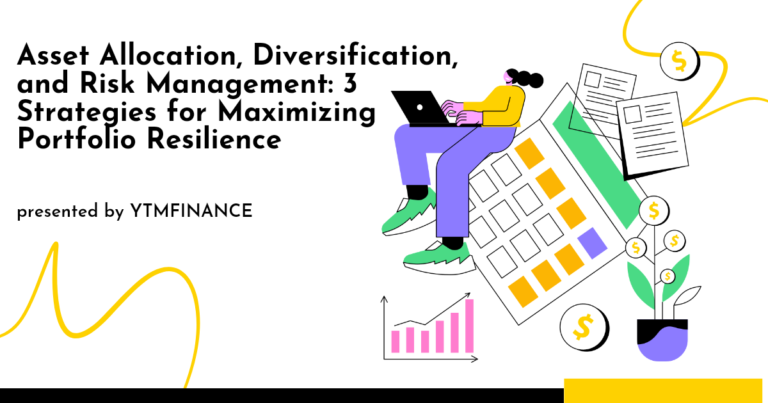Empowering Ethical and Sustainable Finance: 7 Strategies for Impact and Success

Title: Navigating Ethical and Sustainable Finance: A Comprehensive Guide
In today’s rapidly evolving financial landscape, the principles of ethics and sustainability are gaining increasing importance. As investors seek to align their financial goals with their values, concepts such as socially responsible investing (SRI), environmental, social, and governance (ESG) criteria, impact investing, and corporate social responsibility (CSR) initiatives have come to the forefront.
Understanding Socially Responsible Investing (SRI) and ESG Criteria
Socially responsible investing (SRI) involves selecting investments based not only on their financial returns but also on their adherence to ethical, social, and environmental principles. Investors incorporate environmental, social, and governance (ESG) criteria into their decision-making process to assess the sustainability and ethical impact of potential investments. By considering factors such as a company’s environmental practices, treatment of employees, and governance structure, investors can support businesses that prioritize ethical and sustainable practices.
Exploring Impact Investing
Impact investing goes beyond financial returns by intentionally seeking positive social or environmental outcomes alongside financial gains. Impact investors direct capital towards projects, businesses, or initiatives that address pressing social or environmental challenges while generating financial returns. This approach allows investors to make a tangible difference in areas such as renewable energy, affordable housing, education, and healthcare, while still achieving their financial objectives.
Corporate Social Responsibility (CSR) Initiatives
Corporate social responsibility (CSR) initiatives involve businesses taking responsibility for their impact on society and the environment. Companies integrate social and environmental concerns into their business operations and interactions with stakeholders, aiming to create shared value for all stakeholders, including shareholders, employees, customers, and communities. CSR initiatives encompass a wide range of activities, from ethical sourcing and sustainable production practices to community engagement and philanthropy, demonstrating a commitment to making a positive societal impact.
Integrating Ethical and Sustainable Considerations into Finance Decision-Making
Ethical considerations play a crucial role in finance decision-making, influencing investment choices, business practices, and risk management strategies. By incorporating ethical principles into financial decision-making processes, individuals and organizations can contribute to a more sustainable and equitable world. Whether it’s avoiding investments in industries with negative social or environmental impacts, supporting companies with strong ESG performance, or actively engaging with companies to improve their sustainability practices, ethical considerations guide responsible financial behavior.
– Here are some additional topics related to ethical and sustainable finance that you could explore in your article or in future content:
- Green Bonds and Sustainable Financing: Green bonds are financial instruments designed to fund projects with environmental benefits, such as renewable energy infrastructure or energy-efficient buildings. Exploring the growth of green bonds and other sustainable financing mechanisms can provide insights into how capital markets are supporting sustainability initiatives.
- Ethical and Sustainable Banking and Financial Services: Ethical banks and financial institutions prioritize transparency, fairness, and social responsibility in their operations. Discussing the role of ethical banking in promoting sustainable development, supporting community initiatives, and fostering financial inclusion can shed light on alternative models within the finance sector.
- Climate Finance and Carbon Markets: Climate finance involves mobilizing capital to address climate change challenges, such as reducing greenhouse gas emissions, adapting to climate impacts, and transitioning to a low-carbon economy. Exploring the mechanisms of climate finance, including carbon markets and climate-related financial products, can highlight opportunities for investors to contribute to climate action.
- Socially Responsible Entrepreneurship: Socially responsible entrepreneurship focuses on creating businesses that prioritize social and environmental impact alongside financial success. Examining case studies of socially responsible businesses and their innovative approaches to addressing societal challenges can inspire readers to support ethical entrepreneurship and impact-driven ventures.
- Stakeholder Engagement and Advocacy: Effective stakeholder engagement is essential for promoting ethical and sustainable practices within the finance industry. Discussing the role of investors, consumers, NGOs, and policymakers in advocating for responsible finance practices, influencing corporate behavior, and driving systemic change can empower readers to become active participants in shaping a more sustainable financial system.
- Ethical and Sustainable Investment Platforms and Tools: Ethical investment platforms and tools provide investors with resources to assess the social and environmental impact of their investment portfolios. Reviewing different platforms, screening criteria, and impact measurement methodologies can help readers make informed decisions about aligning their investments with their values.
- Regulatory Trends and Standards: Regulatory frameworks and industry standards play a crucial role in shaping the landscape of ethical and sustainable finance. Exploring emerging regulatory trends, such as mandatory ESG reporting requirements or sustainable finance taxonomies, can provide insights into how governments and regulatory bodies are driving the adoption of responsible finance practices.
- Ethical and Sustainable Consumerism and Financial Choices: Ethical consumerism extends beyond purchasing decisions to encompass financial choices such as banking, investing, and insurance. Discussing strategies for aligning financial choices with ethical values, such as choosing ethical investment funds or sustainable banking options, can empower readers to make positive impacts through their everyday financial decisions.
- Microfinance and Financial Inclusion: Microfinance initiatives aim to provide financial services, such as credit and savings, to low-income individuals and underserved communities. Exploring the role of microfinance in promoting financial inclusion, empowering marginalized populations, and fostering economic development can highlight its importance in sustainable finance.
- Gender Lens Investing: Gender lens investing focuses on investing in companies that promote gender equality and women’s empowerment. Discussing the impact of gender lens investing on closing the gender gap in access to finance, supporting women-owned businesses, and driving positive social change can shed light on this emerging trend in sustainable finance.
- Circular Economy Financing: The circular economy seeks to minimize waste and maximize resource efficiency by designing products, services, and systems that prioritize reuse, recycling, and regeneration. Examining financing mechanisms for circular economy projects, such as product-as-a-service models or circular supply chain financing, can showcase innovative approaches to sustainable finance.
- Community Development Finance: Community development finance initiatives aim to channel capital towards projects that benefit local communities, such as affordable housing, small business development, and community infrastructure. Exploring community development financial institutions (CDFIs), community investment funds, and impact investing in underserved areas can highlight the role of finance in driving community empowerment and social cohesion.
- Ethical and Sustainable Supply Chain Finance: Ethical supply chain finance focuses on ensuring that supply chains operate ethically and sustainably, with fair labor practices, environmental stewardship, and responsible sourcing. Discussing strategies for integrating ethical considerations into supply chain financing, addressing supply chain risks, and fostering transparency and accountability can showcase best practices in ethical supply chain management.
- Ethical and Sustainable Agriculture Finance: Sustainable agriculture finance supports environmentally friendly and socially responsible agricultural practices, such as organic farming, regenerative agriculture, and fair trade. Exploring the role of sustainable agriculture finance in promoting food security, mitigating climate change, and supporting rural livelihoods can highlight its potential to drive positive impacts across the agricultural sector.
- Ethical and Sustainable Venture Capital and Startup Funding: Ethical and Sustainable venture capital and startup funding focus on supporting businesses that prioritize social and environmental impact alongside profit. Discussing trends in ethical venture capital, impact investing in startups, and the rise of social entrepreneurship can showcase opportunities for investors to support innovative solutions to pressing global challenges.
- Philanthropy and Impact Investing: Philanthropy and impact investing are complementary approaches to driving social and environmental change. Exploring the intersection of philanthropy and impact investing, such as strategic philanthropy, mission-aligned investing, and blended finance structures, can demonstrate how capital can be deployed for maximum impact across different sectors and geographies.

Read More about investment:- 6 Proven Investment Strategies: Unlocking Corporate Finance Success through Risk Management, Governance, and Strategic Decision-Making
Table of Information:-
Certainly! Below is an example of a table providing information about Ethical and Sustainable Finance practices in different countries:
| Country | Key Initiatives and Regulations | Sustainable Investment Trends | Impact Measurement and Reporting |
|---|---|---|---|
| United States | – Securities and Exchange Commission (SEC) regulations on ESG disclosure – Growth of sustainable investing in sectors like renewable energy and technology | – Rise of ESG integration in mainstream investment strategies – Increasing popularity of impact investing funds | – Adoption of standardized ESG reporting frameworks like SASB and TCFD |
| United Kingdom | – Green Finance Strategy to support sustainable investments – Introduction of mandatory TCFD reporting for listed companies | – Strong growth in green bonds and sustainable finance initiatives – Leading position in ESG research and data analytics | – Emphasis on social impact measurement and reporting in addition to environmental metrics |
| Germany | – Sustainable Finance Strategy to align financial system with sustainability goals – Implementation of EU Taxonomy for sustainable activities | – Significant investments in renewable energy and energy efficiency projects – Growing demand for ethical banking and sustainable investment products | – Development of national impact measurement frameworks and standards |
| Netherlands | – National Action Plan for Sustainable Finance – Dutch Banking Sector Agreement on international responsible business conduct | – Leading position in green bonds market and sustainable investment funds – Strong emphasis on corporate sustainability reporting and disclosure | – Collaboration between financial institutions and NGOs to develop impact measurement methodologies |
| Australia | – Implementation of Task Force on Climate-related Financial Disclosures (TCFD) recommendations – Rise of impact investing in sectors like healthcare and education | – Growth of green finance initiatives and sustainable infrastructure projects – Increasing demand for ethical superannuation and investment options | – Adoption of integrated reporting frameworks to assess financial and non-financial performance |
FAQs
Certainly! Here are some frequently asked questions (FAQs) about Ethical and Sustainable Finance practices in different countries, along with clear and understandable answers:
- What is Ethical and Sustainable Finance?
- Ethical and Sustainable Finance refers to financial practices that take into account environmental, social, and governance (ESG) factors in investment decision-making. It involves considering the long-term impact of investments on society, the environment, and corporate governance practices.
- Why is Ethical and Sustainable Finance Important?
- Ethical and Sustainable Finance is important because it promotes responsible investing that aligns with social and environmental goals. It encourages businesses and investors to consider the broader impact of their financial decisions, leading to more sustainable and equitable outcomes for both people and the planet.
- What are Some Key Initiatives in Ethical and Sustainable Finance Across Different Countries?
- Key initiatives in Ethical and Sustainable Finance vary by country but may include regulations mandating ESG disclosure, national strategies for sustainable finance, and industry-led initiatives promoting responsible investment practices. Examples include the EU Taxonomy for sustainable activities, the UK’s Green Finance Strategy, and Australia’s Task Force on Climate-related Financial Disclosures (TCFD) recommendations.
- How Do Different Countries Approach Sustainable Investment Trends?
- Different countries approach sustainable investment trends in various ways, depending on factors such as regulatory frameworks, market conditions, and societal priorities. Some countries may prioritize investments in renewable energy and clean technology, while others may focus on social impact sectors like healthcare and education.
- What Are Some Challenges in Implementing Ethical and Sustainable Finance Practices Globally?
- Challenges in implementing Ethical and Sustainable Finance practices globally include the lack of standardized ESG reporting frameworks, the need for greater transparency and accountability in investment processes, and the complexity of measuring social and environmental impacts. Additionally, differences in regulatory environments and cultural norms can pose obstacles to global adoption.
- How Can Individuals and Organizations Contribute to Ethical and Sustainable Finance Practices?
- Individuals and organizations can contribute to Ethical and Sustainable Finance practices by incorporating ESG considerations into investment decisions, supporting companies with strong sustainability practices, advocating for policy changes that promote responsible finance, and engaging in dialogue with stakeholders to drive positive change.
- What Are the Benefits of Ethical and Sustainable Finance Practices for Investors and Society?
- The benefits of Ethical and Sustainable Finance practices for investors include improved risk management, enhanced long-term financial performance, and alignment with personal values. For society, these practices contribute to environmental protection, social equity, and the transition to a more sustainable economy.
- How Can I Stay Informed About Ethical and Sustainable Finance Developments in Different Countries?
- Staying informed about Ethical and Sustainable Finance developments in different countries can involve following reputable news sources, engaging with industry reports and research publications, participating in relevant conferences and events, and connecting with organizations and networks focused on sustainable finance issues.
Conclusion
Ethical and sustainable finance is not just a trend; it’s a fundamental shift towards a more responsible and inclusive financial system. By embracing concepts such as socially responsible investing, impact investing, corporate social responsibility, and ethical decision-making, investors and businesses can create positive change while achieving their financial goals. As awareness grows and demand for ethical and sustainable finance continues to rise, integrating these principles into financial practices becomes increasingly vital for building a better future for all.





